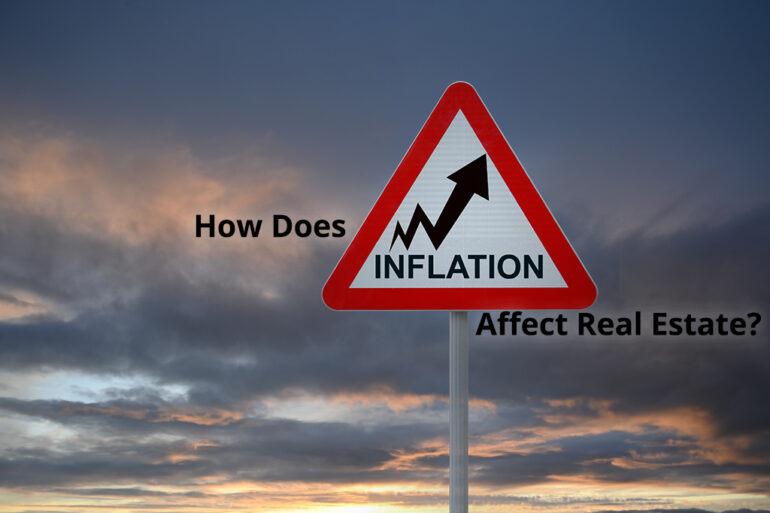How Does Inflation Affect My Real Estate Investment?
Every economic cycle goes through periods of inflation. In fact, inflation is typically a sign that an economic cycle is getting ready to reset.
A sudden surge in inflation can have a nasty impact on your real estate investment portfolio. Investors who are not adequately prepared could experience catastrophic results, while those who plan appropriately can easily weather the storm.
What Exactly Is Inflation?
In general, inflation is an average increase in the price of certain goods or services over a period of time. Inflation isn’t just rising prices for a single good. Inflation exists across an entire sector or industry, like real estate or even the whole economy of a country.
The U.S. typically measures inflation through the Consumer Price Index (CPI), the Producer Price Index (PPI), and the Personal Consumption Expenditures Price Index (PCE). These different systems use various measures to track how prices change throughout an economic sector or the economy as a whole.
If inflation means prices go up, the power of your dollar goes down. A little bit of inflation, however, is part of a healthy economy. Inflation can lead people to spend or invest their money instead of just sitting on it, which helps motivate economic growth.
Inflation can also be a massively destructive force when it gets out of hand — in extreme cases, a country’s economy can collapse. In more familiar terms, it can wreck your investment portfolio.
How Does Inflation Impact Real Estate?
Inflation typically impacts the financial, energy, and utility sectors the hardest. That doesn’t mean it can’t wreak havoc in the real estate sector. Understanding the potential outcomes of inflation on real estate investments can help investors come out on top.
Here are the most common effects of inflation on the real estate market.
Property Values Increase
When prices go up on materials, the cost of new construction goes up as well. Construction companies have to raise the prices of their finished homes to account for the rise in lumber, concrete, and other building materials.
As new homes hit the market with higher prices, existing properties will experience a surge in price as well. This downstream effect makes sense. If new homes go up in value, homebuyers will look towards pre-owned houses. As the demand for used homes goes up, competition increases and causes higher prices across the board.
Interest Rates Increase
Rising prices are usually not conducive to favorable loan terms. As a currency loses its value, lenders tend to raise interest rates to match. The rise in interest rates is meant to cover losses that come from the decrease in the value of your dollar.
Since most construction companies rely on loans to build houses, increased interest rates force the price of new houses to go up. Higher interest rates can also make it more difficult for homebuyers to purchase the houses they want.
Rental Prices Increase
One of the most noticeable impacts of inflation on the real estate market is the increased rate of rental properties. When housing costs go up and loans are more challenging to obtain, consumers look to rental properties. A higher demand for rental properties means landlords can increase their rates to take advantage of the competition.
Hedging Against Inflation
Inflation may be a negative occurrence overall, but it does offer some unique opportunities to real estate investors. In fact, investment properties can be an excellent asset during periods of inflation.
Appreciation Makes a Difference
In general, the appreciation rate of real estate tends to offset the rate of inflation. That doesn’t mean you’re completely safe from a sudden spike in prices or significant inflation period, but it can protect your investment overall.
Higher Sale Prices
If you’ve been thinking about selling one or more of your real estate investments, inflation periods work in your favor. Since housing prices go up along with competition for existing homes, selling during this time can produce a nice profit.
Anyone trying to buy or sell a house during peak inflation periods will notice bidding wars and “as is” purchases. The major challenge here is knowing when to sell to maximize profit on the home.
High Returns on Rental Properties
Real estate investors stand to benefit the most from periods of inflation. As people shy away from more expensive housing and pricey loans, rental properties become more valuable. Landlords can raise rents while reducing vacancies. If your investments utilize fixed-rate loans, the additional income can be used to pay off those mortgages much faster.
Profiting from the Real Estate Market without Buying Property
Investors who are looking to improve their portfolio during a period of inflation run into the same issues other homebuyers do. The prices of new investment properties soar, making it difficult to secure the appropriate loan or find an affordable price on new properties.
Luckily, there are other ways to profit during a period of inflation without necessarily purchasing new properties. You can increase your real estate investment portfolio through several prudent moves:
- Invest in mutual funds that specialize in the housing market
- Invest in a real estate investment trust (REIT)
- Invest in private equity funds that focus on real estate
- Join a real estate crowdfunding platform
While these methods may not produce the same return as selling an investment property or raising rental prices on existing properties, you can still benefit. These different methods help spread your investments across a more significant number of assets, which can offer you both protection in the case of a failure and a sizable return in time.
Inflation Will Happen, So Be Prepared
The onset of inflation isn’t a matter of if but of when. Periods of inflation are standard elements of a healthy economy. Other forces can also trigger inflation periods, like natural disasters, global pandemics, and more.
Knowing how inflation impacts the real estate market can help you make the right decisions to best thrive during this time. Making the right moves with your investment portfolio can also help protect you during tumultuous times.








